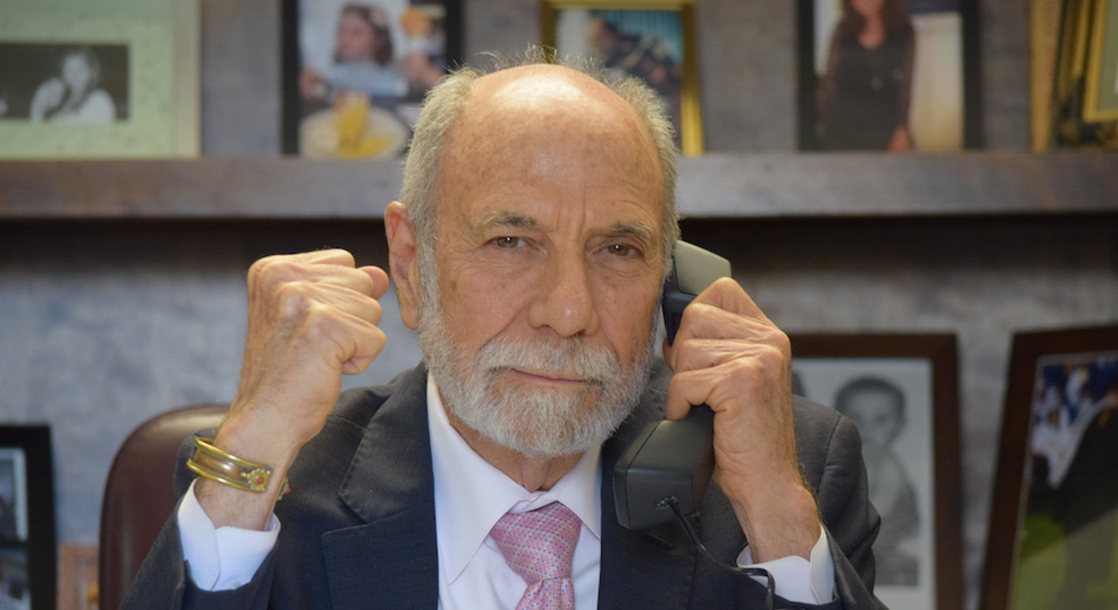All photos by the author
For nearly 50 years, Los Angeles attorney Bruce Margolin has been defending cannabis consumers in Southern California. The lawyer has been instrumental in defending thousands of clients from prosecution and has also helped pass some of the most progressive marijuana laws in the nation.
Margolin’s life quest to help cannabis consumers began in 1971 when he retired from general practice and took a trip to India with spiritual leader Baba Ram Dass. After experiencing a spiritual enlightenment, Margolin returned to Los Angeles to practice law, with a focus on defending those who he believed had been unfairly charged with marijuana-related crimes. In 1973, he became Executive Director of the Los Angeles chapter of NORML, the largest such organization in the nation. 44 years later, Margolin continues to lead this influential group.
His half-century of dedication defending cannabis consumers has involved many twists and turns. In 1999, Margolin was awarded the Criminal Defense Attorney of the Year award by the Century City Bar Association. In the California recall election of 2003, Margolin unsuccessfully ran for governor on a platform of cannabis legalization; if elected, he planned to free all cannabis prisoners. Margolin has even represented some famous clients, including icons like Timothy Leary, Linda Lovelace, Christian Brando, and members of the band Guns n’ Roses. He is also the author of The Margolin Guide to Marijuana Laws (which is priced at $4.20, naturally).
With the recent passage of Proposition 64 last November, the Golden State is now faced with the arduous task of developing industry regulations and compliance oversight for cannabis businesses. MERRY JANE recently sat down with Margolin at his office in West Hollywood to discuss the state of cannabis legalization and the opportunities for cannabis businesses in California.
MERRY JANE: Let’s talk about the current state of cannabis legalization in California. So far, how is Prop 64 being manifested in terms of regulations and the government actually allowing cannabis businesses to legally open their doors?
Bruce Margolin: We currently have about 80 or 90 legitimate dispensaries in the Los Angeles area. But we have a bunch of rogue dispensaries in LA, too… about 500 of them. They’re all over the place. A lot of people think that they will be grandfathered in. I don’t know if that’s going to happen. I doubt it.
Here’s the history of what happened in California: In 1996, we passed the Compassionate Use Act, or Proposition 215. That provided for possession and cultivation of marijuana by patients, but it didn’t allow any way of getting marijuana. Where can you get the seed to grow it? Where can you buy it? Where can you share it? How much can you have? None of that was addressed.
Thus, the California Assembly passed Senate Bill 420 [in 2003] to put in place an opportunity for patients to come together under collectives and co-ops. It also provided a gauge for law enforcement to know how much patients could legally possess. It was a guideline. Out of the collectives and co-ops grew the dispensaries. Senate Bill 420 also features a bunch of vagueness. Many legal cases went before the Court of Appeals, something I reflect in my book The Margolin Guide to Marijuana Laws. It’s my 20th anniversary of publishing this guide, which I give out to all of the dispensaries and anybody else who wants it. It tells you the nitty gritty of the laws.
How has the complexity of these laws affected patients and cannabis businesses?
Before Prop 64, the laws in California were a mess. Many lawyers were overwhelmed because the cannabis cases are so complicated. So they didn’t want to take the cases and didn’t know what to do with them when they did.
The courts were also confused. Even the Attorney General of California at the time, Kamala Harris, wrote a letter to the State Legislature saying that she couldn’t develop guidelines — which were required — because she was confused. She wanted clarification about profit, edibles, and other areas of the law. Thus, she implored the legislature to develop new legislation.
As a result of her request, in 2015, the Legislature passed Assembly Bill 266. They did this for many reasons. First, they wanted to get a piece of the action. In other words, they wanted taxation and regulation. AB 266 provided for everything from seed to sale. However, these licenses are not to be issued until 2018. In the interim, in order to get a license from the state, a cannabis business must obtain one from the local jurisdiction, the city or county. This is because the local jurisdictions have autonomy over land use rights.
Unfortunately, when AB 266 first emerged, most cities and counties in California — there are about 500 in the state — opted out of allowing any type of participation in the cannabis industry. In fact, most don’t even allow cultivation. They have banned cultivation of cannabis in every aspect, even in one’s own home. This has been very disappointing to us.

How did you, personally, respond to the legal mess created by the regulatory layers of Proposition 215 and Assembly Bill 266?
I wrote some articles for the Daily Journal, pointing out that the bans were unnecessary. Fortunately, about three weeks after I wrote that article, the legislature amended the regulations. But cities and counties maintained their bans. The courts upheld that, under land use rights — cities and counties could not only outlaw or ban dispensaries, they could ban all marijuana activities. Let’s give an example of what’s happened here. In the county of Los Angeles, there is a complete ban on cultivation and any type of dispensary or transportation service. However, Prop 215 has not been overturned by more recent legislation like AB 266 and Prop 64.
There’s a lot of misperception regarding the effect of Prop 64 and AB 266 and Prop 215….
Prop 64 does not replace Prop 215. As a matter of fact, Prop 64 explicitly states that it does not affect the rights of patients or caregivers afforded in Prop 215. Under Prop 215, patients can grow marijuana for themselves or have caregivers grow for them. They can also transport amounts necessary for their medical needs. That still exists.
But Senate Bill 420, which provides for collectives and co-ops, will be replaced by the licensing regulations. Why? Senate Bill 420 was intended simply to provide for patients to obtain cannabis medicine on a non-profit basis. That meant that cities and counties were not collecting taxes because it was non-profit.
To make things worse, patients weren’t doing a very good job of following the law. After states like Colorado, Oregon, and Washington legalized adult use consumption, the good news was that the federal government stated that legal states with robust regulations — which prevent things like diversion to the black market — would not be touched. Thus, AB 266 went into effect on January 1, 2016.
What was the real effect of AB 266?
Well, even though it went into effect, it didn’t mean that licenses were being issued. This is because licenses have to be granted by the local governments first. But most of the local jurisdictions have not done this. I’d estimate that 95 percent haven’t done it! Maybe five percent of the cities and counties actually have legislation now that provides for licensing.
Now this licensing is different. First, it extends beyond medical consumption to “adult use” and profit is now allowed. But in consequence, we have taxation. And everything from seed to sale is being taxed. Taxes upon taxes…. AB 266 is allegedly “robust legislation” that is intended to satisfy the federal government and, secondly, provide for taxation.
Given that complex state of regulatory oversight, how does Proposition 64 affect patients, adult users, and cannabis businesses?
Today, California has three layers of laws: Proposition 215, AB 266, and now Proposition 64. Prop 64 is the initiative we passed to legalize adult use cannabis. It mimics AB 266 regarding licensing. One important difference is that those with drug convictions are precluded from participation under AB 266. Under Prop 64, however, marijuana convictions do not interfere with one’s right to obtain a license. This is important to the thousands of people who have been part of the culture and this cottage industry for more than 30 years in California. It would be very unfair for all of those people who suffered being busted to not have access to licensing.
Let’s talk about the city of Los Angeles specifically.
In Los Angeles, legislation called Proposition D was passed by the city, pursuant to an initiative. It limited the number of dispensaries to 134. The rest of the dispensaries are illegal. Recently, Los Angeles held an election and passed Proposition M. Unfortunately, it doesn’t specify the number of licenses that will be granted. It simply gives autonomy to the city to administer licensing.
Does this mean the city can do whatever it wants, even take negative actions, such as granting no licenses?
Yes. I’ve been in touch with many City Council members. We passed Proposition M by 80 percent! Proposition 215 passed with 56 percent of the vote. Let’s get hip, guys! You’re going to lose your City Council positions! But they haven’t seemed too impressed by this argument. One would think that they would take action and pass regulations to keep their jobs.
Unfortunately, we’re dealing with local legislators, and the ones who influence them are those with the money, honey. They’re the ones who already own businesses and big properties and have made donations to political campaigns. But most of them are naysayers when it comes to recognizing the appropriateness of medical marijuana or any type of use. So they’re not very hip to coming onboard and being proponents, let alone voting for new legislation. Plus, this is all very complex and confusing. How are they going to do it? How are they going to enforce the regulations?
What is your response to such legislators and opponents of legalization?
I try to argue that, if they don’t put legislation up, we’re going to have a continued black market and it’s going to impose on the city and county the cost of incarceration. Meanwhile, they won’t be making any money on taxes. So they better wake up and smell the roses, folks.
But I think they’re coming around. I’m confident that, in the next few years, we’re going to experience a lot of licensing around the state. While we currently don’t have licensing in the city of Los Angeles, we have it in Long Beach, Lynwood, Desert Hot Springs, Coachella… we have a lot of it going on. There’s also plenty of licensing up in Monterey, San Francisco, and in the Santa Rosa area. So it’s going to happen. But it’s going to take time.
How do you see the future of legalization in the United States?
The numbers are going to continue to grow as society begins to see that legalization is the right way to go. Anything else is irrational. I’m very proud of the fact that we got this far and of my role in helping cannabis legalization since 1967.














